Mental Health Issues of African Refugees in Australia: A Review
VerifiedAdded on 2022/09/09
|18
|5607
|34
Report
AI Summary
This literature review examines the mental health issues experienced by African refugees in Australia. It highlights the prevalence of mental illness, cultural barriers, and the impact of stigma on access to care. The review explores historical neglect of mental health in Africa, the complexities of mental illness, and the economic barriers to treatment. It discusses the lack of awareness, the role of traditional healing, and the influence of prejudices and misconceptions. Furthermore, the review addresses the scarcity of resources, the lack of proper distribution of services, and the impact of insufficient funding on mental health care. The report emphasizes the need for culturally sensitive interventions and improved access to mental health services for African refugees in Australia.
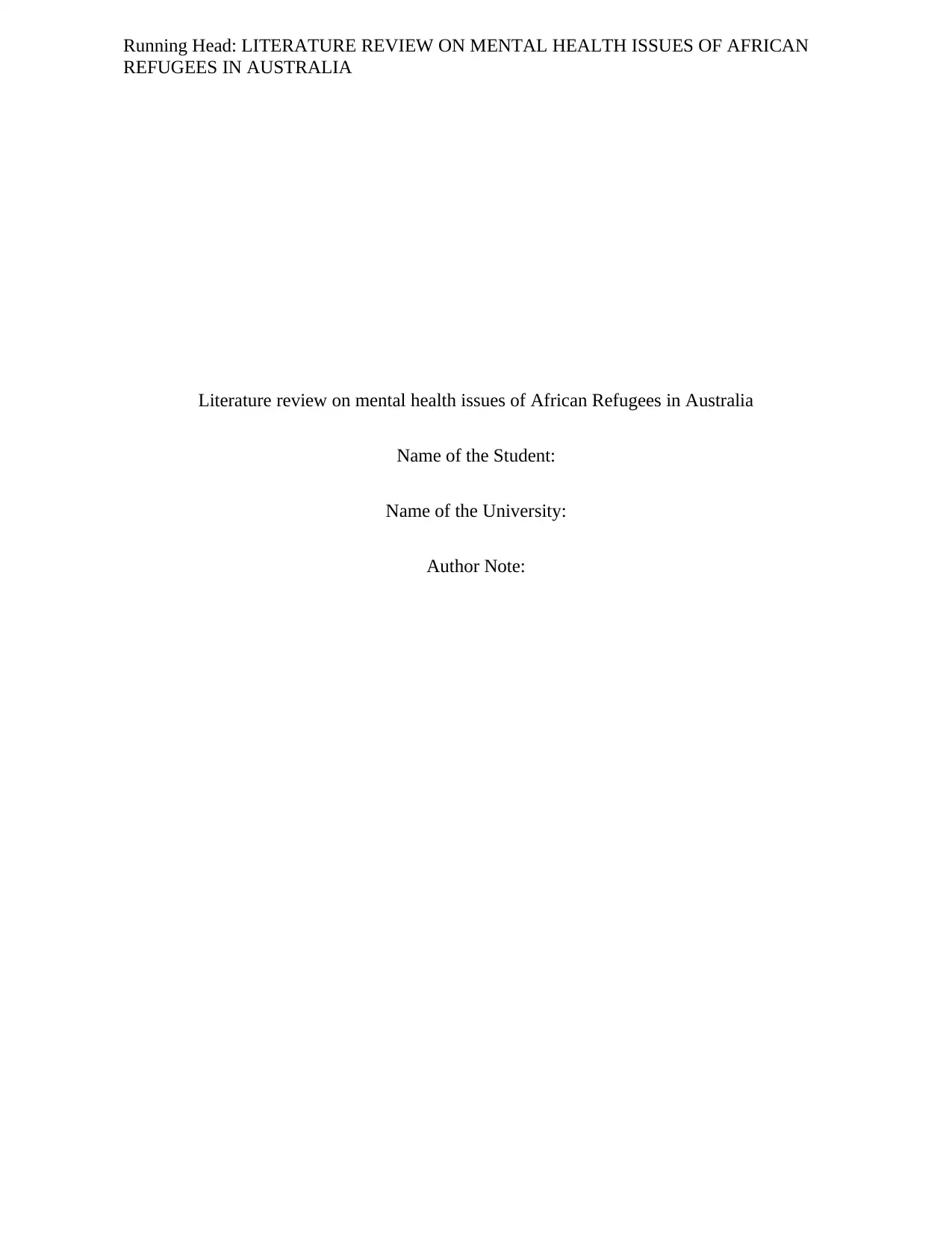
Running Head: LITERATURE REVIEW ON MENTAL HEALTH ISSUES OF AFRICAN
REFUGEES IN AUSTRALIA
Literature review on mental health issues of African Refugees in Australia
Name of the Student:
Name of the University:
Author Note:
REFUGEES IN AUSTRALIA
Literature review on mental health issues of African Refugees in Australia
Name of the Student:
Name of the University:
Author Note:
Paraphrase This Document
Need a fresh take? Get an instant paraphrase of this document with our AI Paraphraser
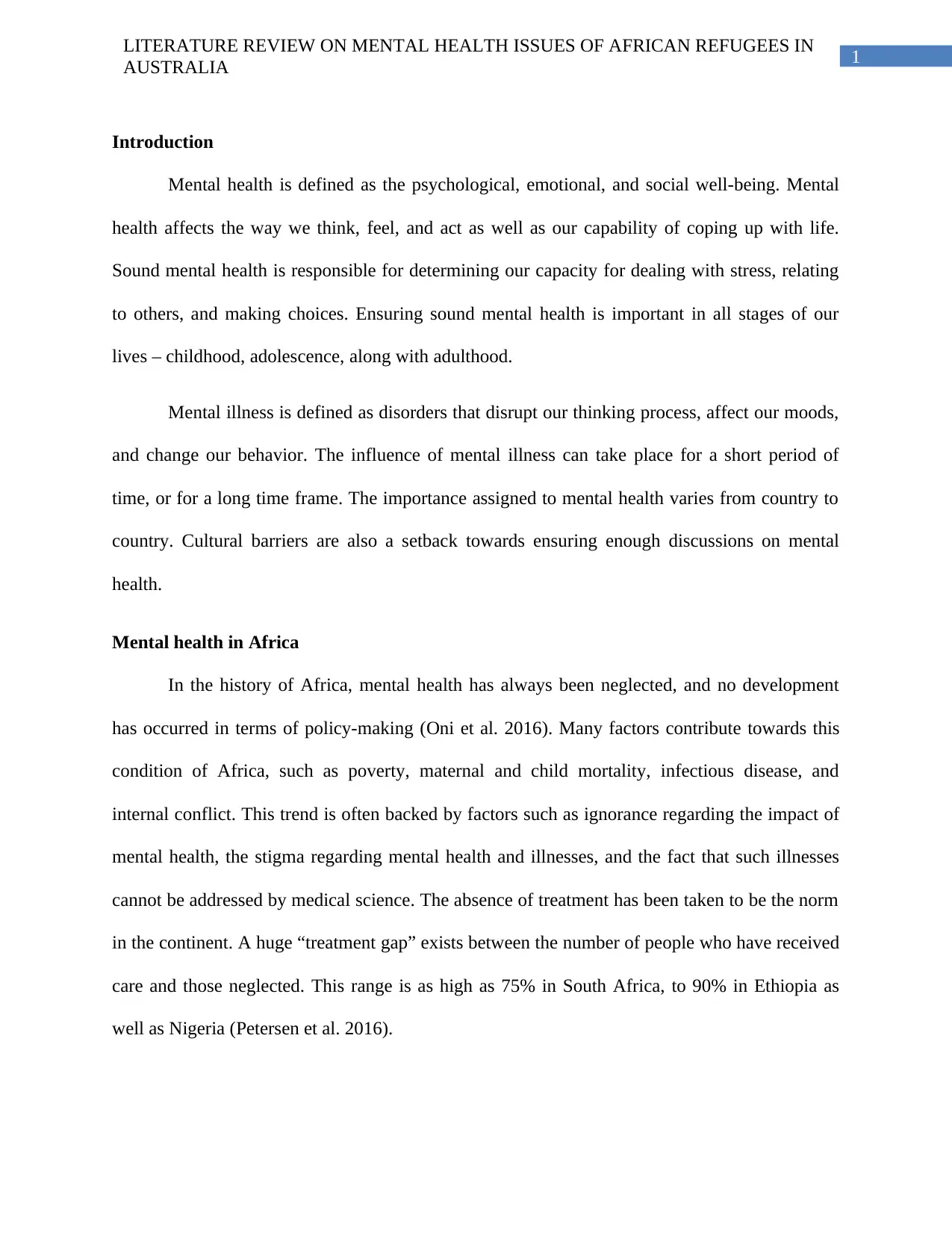
1
LITERATURE REVIEW ON MENTAL HEALTH ISSUES OF AFRICAN REFUGEES IN
AUSTRALIA
Introduction
Mental health is defined as the psychological, emotional, and social well-being. Mental
health affects the way we think, feel, and act as well as our capability of coping up with life.
Sound mental health is responsible for determining our capacity for dealing with stress, relating
to others, and making choices. Ensuring sound mental health is important in all stages of our
lives – childhood, adolescence, along with adulthood.
Mental illness is defined as disorders that disrupt our thinking process, affect our moods,
and change our behavior. The influence of mental illness can take place for a short period of
time, or for a long time frame. The importance assigned to mental health varies from country to
country. Cultural barriers are also a setback towards ensuring enough discussions on mental
health.
Mental health in Africa
In the history of Africa, mental health has always been neglected, and no development
has occurred in terms of policy-making (Oni et al. 2016). Many factors contribute towards this
condition of Africa, such as poverty, maternal and child mortality, infectious disease, and
internal conflict. This trend is often backed by factors such as ignorance regarding the impact of
mental health, the stigma regarding mental health and illnesses, and the fact that such illnesses
cannot be addressed by medical science. The absence of treatment has been taken to be the norm
in the continent. A huge “treatment gap” exists between the number of people who have received
care and those neglected. This range is as high as 75% in South Africa, to 90% in Ethiopia as
well as Nigeria (Petersen et al. 2016).
LITERATURE REVIEW ON MENTAL HEALTH ISSUES OF AFRICAN REFUGEES IN
AUSTRALIA
Introduction
Mental health is defined as the psychological, emotional, and social well-being. Mental
health affects the way we think, feel, and act as well as our capability of coping up with life.
Sound mental health is responsible for determining our capacity for dealing with stress, relating
to others, and making choices. Ensuring sound mental health is important in all stages of our
lives – childhood, adolescence, along with adulthood.
Mental illness is defined as disorders that disrupt our thinking process, affect our moods,
and change our behavior. The influence of mental illness can take place for a short period of
time, or for a long time frame. The importance assigned to mental health varies from country to
country. Cultural barriers are also a setback towards ensuring enough discussions on mental
health.
Mental health in Africa
In the history of Africa, mental health has always been neglected, and no development
has occurred in terms of policy-making (Oni et al. 2016). Many factors contribute towards this
condition of Africa, such as poverty, maternal and child mortality, infectious disease, and
internal conflict. This trend is often backed by factors such as ignorance regarding the impact of
mental health, the stigma regarding mental health and illnesses, and the fact that such illnesses
cannot be addressed by medical science. The absence of treatment has been taken to be the norm
in the continent. A huge “treatment gap” exists between the number of people who have received
care and those neglected. This range is as high as 75% in South Africa, to 90% in Ethiopia as
well as Nigeria (Petersen et al. 2016).
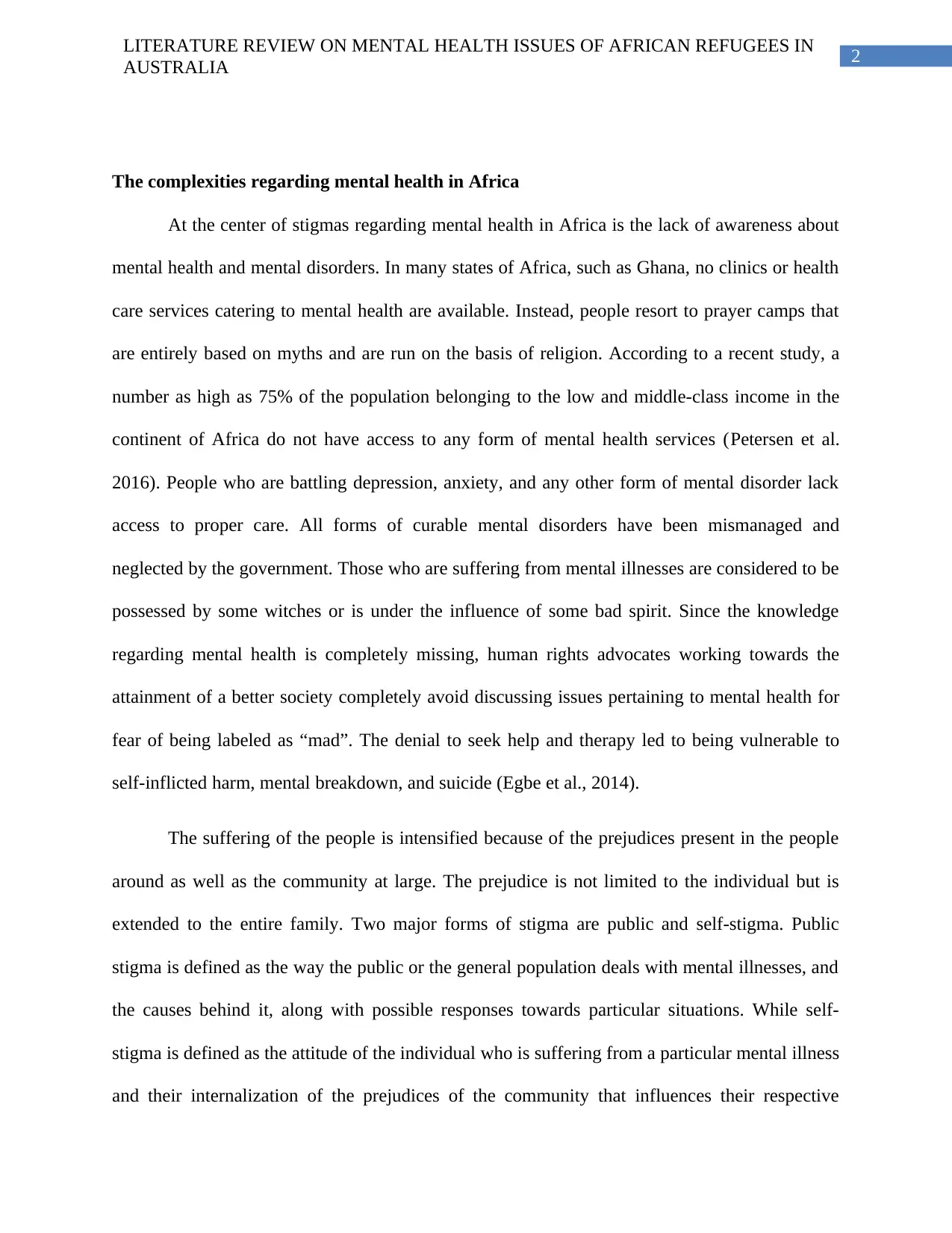
2
LITERATURE REVIEW ON MENTAL HEALTH ISSUES OF AFRICAN REFUGEES IN
AUSTRALIA
The complexities regarding mental health in Africa
At the center of stigmas regarding mental health in Africa is the lack of awareness about
mental health and mental disorders. In many states of Africa, such as Ghana, no clinics or health
care services catering to mental health are available. Instead, people resort to prayer camps that
are entirely based on myths and are run on the basis of religion. According to a recent study, a
number as high as 75% of the population belonging to the low and middle-class income in the
continent of Africa do not have access to any form of mental health services (Petersen et al.
2016). People who are battling depression, anxiety, and any other form of mental disorder lack
access to proper care. All forms of curable mental disorders have been mismanaged and
neglected by the government. Those who are suffering from mental illnesses are considered to be
possessed by some witches or is under the influence of some bad spirit. Since the knowledge
regarding mental health is completely missing, human rights advocates working towards the
attainment of a better society completely avoid discussing issues pertaining to mental health for
fear of being labeled as “mad”. The denial to seek help and therapy led to being vulnerable to
self-inflicted harm, mental breakdown, and suicide (Egbe et al., 2014).
The suffering of the people is intensified because of the prejudices present in the people
around as well as the community at large. The prejudice is not limited to the individual but is
extended to the entire family. Two major forms of stigma are public and self-stigma. Public
stigma is defined as the way the public or the general population deals with mental illnesses, and
the causes behind it, along with possible responses towards particular situations. While self-
stigma is defined as the attitude of the individual who is suffering from a particular mental illness
and their internalization of the prejudices of the community that influences their respective
LITERATURE REVIEW ON MENTAL HEALTH ISSUES OF AFRICAN REFUGEES IN
AUSTRALIA
The complexities regarding mental health in Africa
At the center of stigmas regarding mental health in Africa is the lack of awareness about
mental health and mental disorders. In many states of Africa, such as Ghana, no clinics or health
care services catering to mental health are available. Instead, people resort to prayer camps that
are entirely based on myths and are run on the basis of religion. According to a recent study, a
number as high as 75% of the population belonging to the low and middle-class income in the
continent of Africa do not have access to any form of mental health services (Petersen et al.
2016). People who are battling depression, anxiety, and any other form of mental disorder lack
access to proper care. All forms of curable mental disorders have been mismanaged and
neglected by the government. Those who are suffering from mental illnesses are considered to be
possessed by some witches or is under the influence of some bad spirit. Since the knowledge
regarding mental health is completely missing, human rights advocates working towards the
attainment of a better society completely avoid discussing issues pertaining to mental health for
fear of being labeled as “mad”. The denial to seek help and therapy led to being vulnerable to
self-inflicted harm, mental breakdown, and suicide (Egbe et al., 2014).
The suffering of the people is intensified because of the prejudices present in the people
around as well as the community at large. The prejudice is not limited to the individual but is
extended to the entire family. Two major forms of stigma are public and self-stigma. Public
stigma is defined as the way the public or the general population deals with mental illnesses, and
the causes behind it, along with possible responses towards particular situations. While self-
stigma is defined as the attitude of the individual who is suffering from a particular mental illness
and their internalization of the prejudices of the community that influences their respective
⊘ This is a preview!⊘
Do you want full access?
Subscribe today to unlock all pages.

Trusted by 1+ million students worldwide
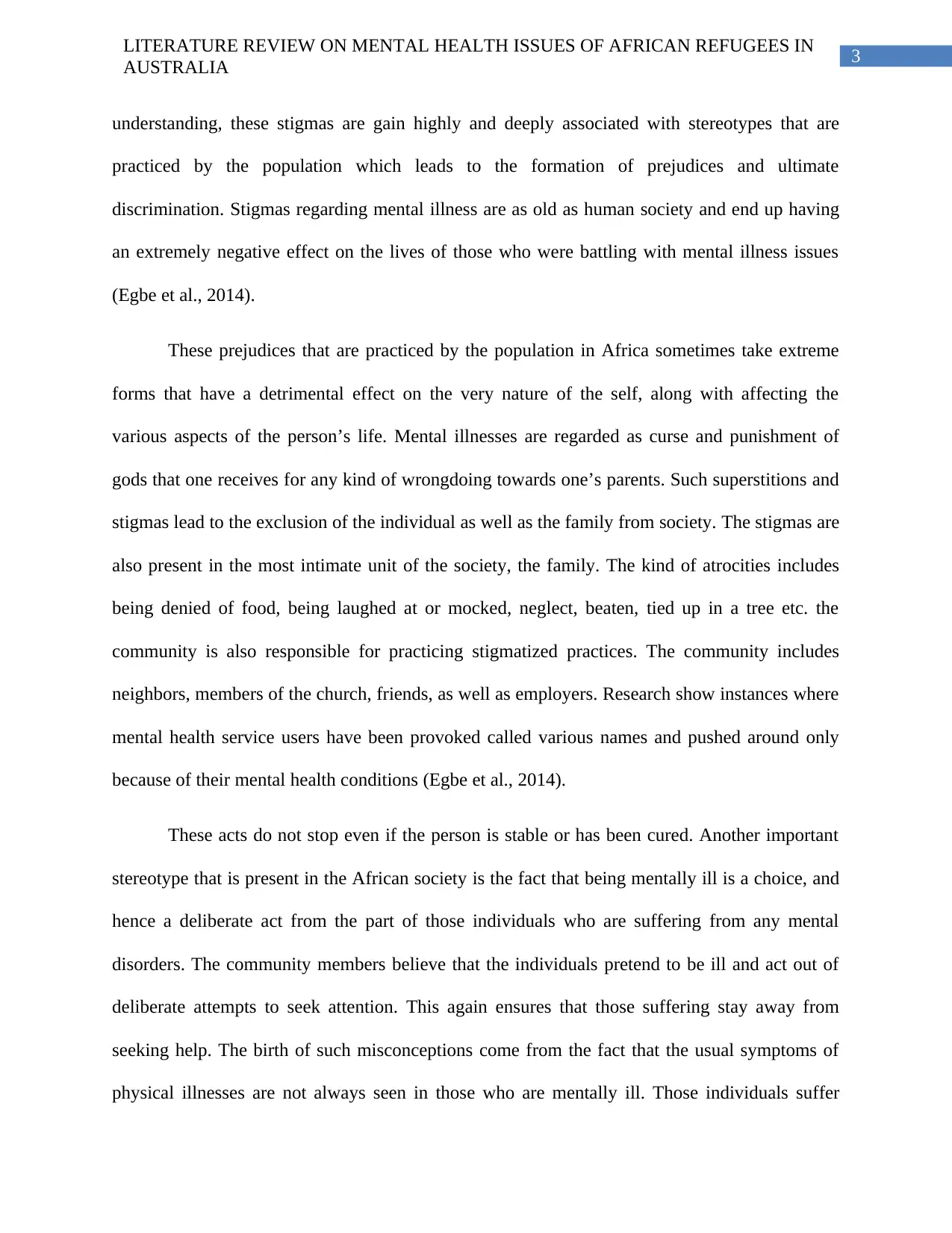
3
LITERATURE REVIEW ON MENTAL HEALTH ISSUES OF AFRICAN REFUGEES IN
AUSTRALIA
understanding, these stigmas are gain highly and deeply associated with stereotypes that are
practiced by the population which leads to the formation of prejudices and ultimate
discrimination. Stigmas regarding mental illness are as old as human society and end up having
an extremely negative effect on the lives of those who were battling with mental illness issues
(Egbe et al., 2014).
These prejudices that are practiced by the population in Africa sometimes take extreme
forms that have a detrimental effect on the very nature of the self, along with affecting the
various aspects of the person’s life. Mental illnesses are regarded as curse and punishment of
gods that one receives for any kind of wrongdoing towards one’s parents. Such superstitions and
stigmas lead to the exclusion of the individual as well as the family from society. The stigmas are
also present in the most intimate unit of the society, the family. The kind of atrocities includes
being denied of food, being laughed at or mocked, neglect, beaten, tied up in a tree etc. the
community is also responsible for practicing stigmatized practices. The community includes
neighbors, members of the church, friends, as well as employers. Research show instances where
mental health service users have been provoked called various names and pushed around only
because of their mental health conditions (Egbe et al., 2014).
These acts do not stop even if the person is stable or has been cured. Another important
stereotype that is present in the African society is the fact that being mentally ill is a choice, and
hence a deliberate act from the part of those individuals who are suffering from any mental
disorders. The community members believe that the individuals pretend to be ill and act out of
deliberate attempts to seek attention. This again ensures that those suffering stay away from
seeking help. The birth of such misconceptions come from the fact that the usual symptoms of
physical illnesses are not always seen in those who are mentally ill. Those individuals suffer
LITERATURE REVIEW ON MENTAL HEALTH ISSUES OF AFRICAN REFUGEES IN
AUSTRALIA
understanding, these stigmas are gain highly and deeply associated with stereotypes that are
practiced by the population which leads to the formation of prejudices and ultimate
discrimination. Stigmas regarding mental illness are as old as human society and end up having
an extremely negative effect on the lives of those who were battling with mental illness issues
(Egbe et al., 2014).
These prejudices that are practiced by the population in Africa sometimes take extreme
forms that have a detrimental effect on the very nature of the self, along with affecting the
various aspects of the person’s life. Mental illnesses are regarded as curse and punishment of
gods that one receives for any kind of wrongdoing towards one’s parents. Such superstitions and
stigmas lead to the exclusion of the individual as well as the family from society. The stigmas are
also present in the most intimate unit of the society, the family. The kind of atrocities includes
being denied of food, being laughed at or mocked, neglect, beaten, tied up in a tree etc. the
community is also responsible for practicing stigmatized practices. The community includes
neighbors, members of the church, friends, as well as employers. Research show instances where
mental health service users have been provoked called various names and pushed around only
because of their mental health conditions (Egbe et al., 2014).
These acts do not stop even if the person is stable or has been cured. Another important
stereotype that is present in the African society is the fact that being mentally ill is a choice, and
hence a deliberate act from the part of those individuals who are suffering from any mental
disorders. The community members believe that the individuals pretend to be ill and act out of
deliberate attempts to seek attention. This again ensures that those suffering stay away from
seeking help. The birth of such misconceptions come from the fact that the usual symptoms of
physical illnesses are not always seen in those who are mentally ill. Those individuals suffer
Paraphrase This Document
Need a fresh take? Get an instant paraphrase of this document with our AI Paraphraser
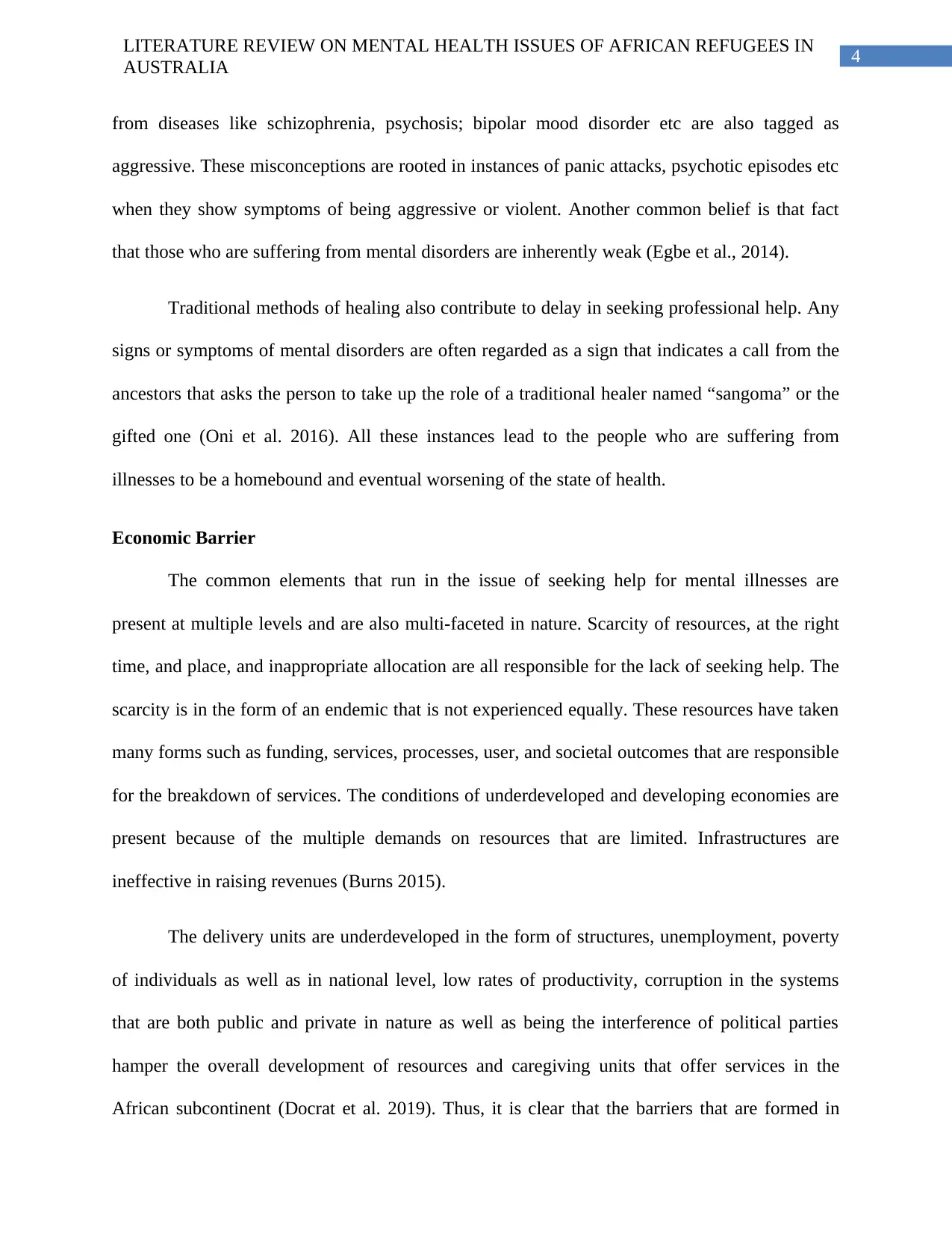
4
LITERATURE REVIEW ON MENTAL HEALTH ISSUES OF AFRICAN REFUGEES IN
AUSTRALIA
from diseases like schizophrenia, psychosis; bipolar mood disorder etc are also tagged as
aggressive. These misconceptions are rooted in instances of panic attacks, psychotic episodes etc
when they show symptoms of being aggressive or violent. Another common belief is that fact
that those who are suffering from mental disorders are inherently weak (Egbe et al., 2014).
Traditional methods of healing also contribute to delay in seeking professional help. Any
signs or symptoms of mental disorders are often regarded as a sign that indicates a call from the
ancestors that asks the person to take up the role of a traditional healer named “sangoma” or the
gifted one (Oni et al. 2016). All these instances lead to the people who are suffering from
illnesses to be a homebound and eventual worsening of the state of health.
Economic Barrier
The common elements that run in the issue of seeking help for mental illnesses are
present at multiple levels and are also multi-faceted in nature. Scarcity of resources, at the right
time, and place, and inappropriate allocation are all responsible for the lack of seeking help. The
scarcity is in the form of an endemic that is not experienced equally. These resources have taken
many forms such as funding, services, processes, user, and societal outcomes that are responsible
for the breakdown of services. The conditions of underdeveloped and developing economies are
present because of the multiple demands on resources that are limited. Infrastructures are
ineffective in raising revenues (Burns 2015).
The delivery units are underdeveloped in the form of structures, unemployment, poverty
of individuals as well as in national level, low rates of productivity, corruption in the systems
that are both public and private in nature as well as being the interference of political parties
hamper the overall development of resources and caregiving units that offer services in the
African subcontinent (Docrat et al. 2019). Thus, it is clear that the barriers that are formed in
LITERATURE REVIEW ON MENTAL HEALTH ISSUES OF AFRICAN REFUGEES IN
AUSTRALIA
from diseases like schizophrenia, psychosis; bipolar mood disorder etc are also tagged as
aggressive. These misconceptions are rooted in instances of panic attacks, psychotic episodes etc
when they show symptoms of being aggressive or violent. Another common belief is that fact
that those who are suffering from mental disorders are inherently weak (Egbe et al., 2014).
Traditional methods of healing also contribute to delay in seeking professional help. Any
signs or symptoms of mental disorders are often regarded as a sign that indicates a call from the
ancestors that asks the person to take up the role of a traditional healer named “sangoma” or the
gifted one (Oni et al. 2016). All these instances lead to the people who are suffering from
illnesses to be a homebound and eventual worsening of the state of health.
Economic Barrier
The common elements that run in the issue of seeking help for mental illnesses are
present at multiple levels and are also multi-faceted in nature. Scarcity of resources, at the right
time, and place, and inappropriate allocation are all responsible for the lack of seeking help. The
scarcity is in the form of an endemic that is not experienced equally. These resources have taken
many forms such as funding, services, processes, user, and societal outcomes that are responsible
for the breakdown of services. The conditions of underdeveloped and developing economies are
present because of the multiple demands on resources that are limited. Infrastructures are
ineffective in raising revenues (Burns 2015).
The delivery units are underdeveloped in the form of structures, unemployment, poverty
of individuals as well as in national level, low rates of productivity, corruption in the systems
that are both public and private in nature as well as being the interference of political parties
hamper the overall development of resources and caregiving units that offer services in the
African subcontinent (Docrat et al. 2019). Thus, it is clear that the barriers that are formed in
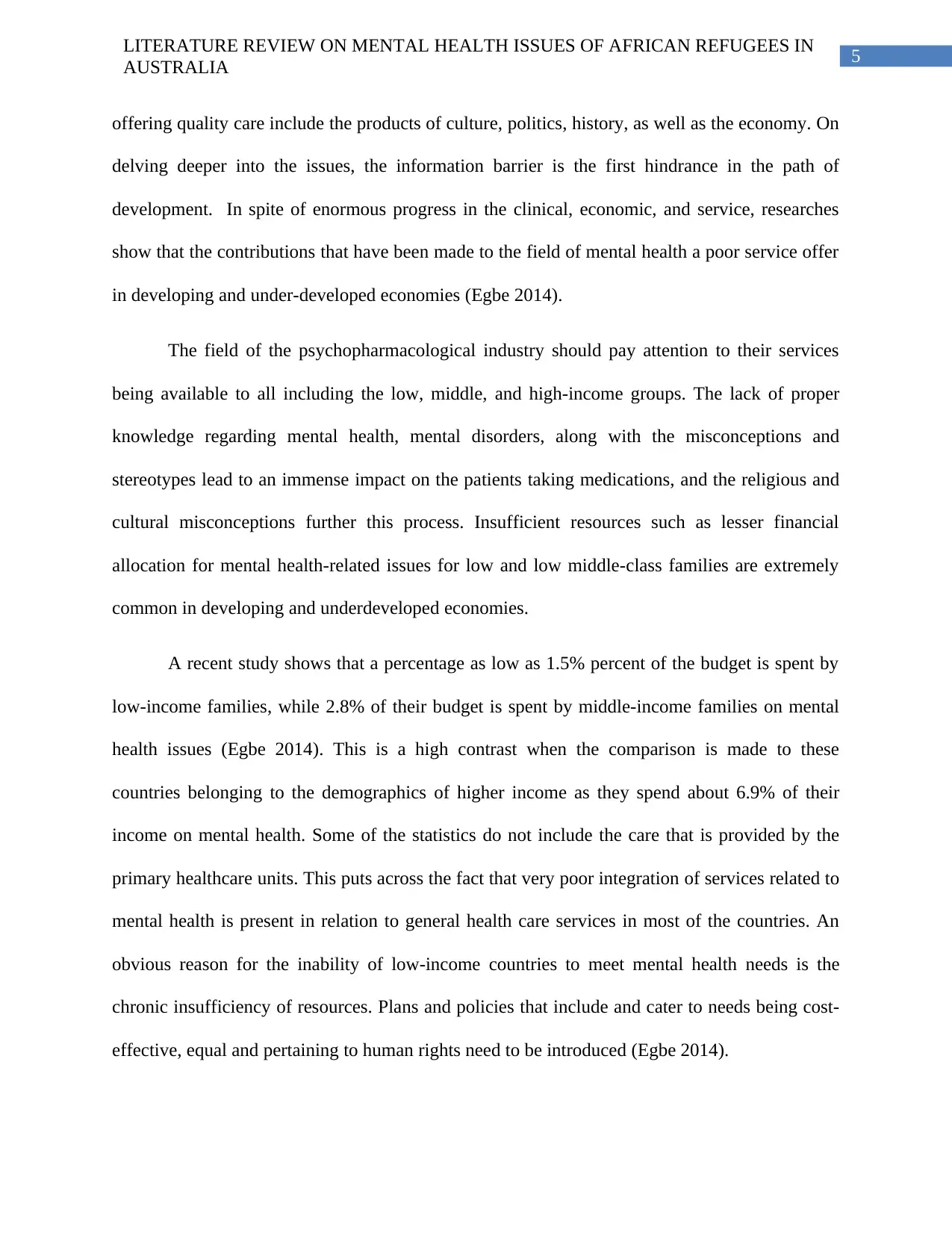
5
LITERATURE REVIEW ON MENTAL HEALTH ISSUES OF AFRICAN REFUGEES IN
AUSTRALIA
offering quality care include the products of culture, politics, history, as well as the economy. On
delving deeper into the issues, the information barrier is the first hindrance in the path of
development. In spite of enormous progress in the clinical, economic, and service, researches
show that the contributions that have been made to the field of mental health a poor service offer
in developing and under-developed economies (Egbe 2014).
The field of the psychopharmacological industry should pay attention to their services
being available to all including the low, middle, and high-income groups. The lack of proper
knowledge regarding mental health, mental disorders, along with the misconceptions and
stereotypes lead to an immense impact on the patients taking medications, and the religious and
cultural misconceptions further this process. Insufficient resources such as lesser financial
allocation for mental health-related issues for low and low middle-class families are extremely
common in developing and underdeveloped economies.
A recent study shows that a percentage as low as 1.5% percent of the budget is spent by
low-income families, while 2.8% of their budget is spent by middle-income families on mental
health issues (Egbe 2014). This is a high contrast when the comparison is made to these
countries belonging to the demographics of higher income as they spend about 6.9% of their
income on mental health. Some of the statistics do not include the care that is provided by the
primary healthcare units. This puts across the fact that very poor integration of services related to
mental health is present in relation to general health care services in most of the countries. An
obvious reason for the inability of low-income countries to meet mental health needs is the
chronic insufficiency of resources. Plans and policies that include and cater to needs being cost-
effective, equal and pertaining to human rights need to be introduced (Egbe 2014).
LITERATURE REVIEW ON MENTAL HEALTH ISSUES OF AFRICAN REFUGEES IN
AUSTRALIA
offering quality care include the products of culture, politics, history, as well as the economy. On
delving deeper into the issues, the information barrier is the first hindrance in the path of
development. In spite of enormous progress in the clinical, economic, and service, researches
show that the contributions that have been made to the field of mental health a poor service offer
in developing and under-developed economies (Egbe 2014).
The field of the psychopharmacological industry should pay attention to their services
being available to all including the low, middle, and high-income groups. The lack of proper
knowledge regarding mental health, mental disorders, along with the misconceptions and
stereotypes lead to an immense impact on the patients taking medications, and the religious and
cultural misconceptions further this process. Insufficient resources such as lesser financial
allocation for mental health-related issues for low and low middle-class families are extremely
common in developing and underdeveloped economies.
A recent study shows that a percentage as low as 1.5% percent of the budget is spent by
low-income families, while 2.8% of their budget is spent by middle-income families on mental
health issues (Egbe 2014). This is a high contrast when the comparison is made to these
countries belonging to the demographics of higher income as they spend about 6.9% of their
income on mental health. Some of the statistics do not include the care that is provided by the
primary healthcare units. This puts across the fact that very poor integration of services related to
mental health is present in relation to general health care services in most of the countries. An
obvious reason for the inability of low-income countries to meet mental health needs is the
chronic insufficiency of resources. Plans and policies that include and cater to needs being cost-
effective, equal and pertaining to human rights need to be introduced (Egbe 2014).
⊘ This is a preview!⊘
Do you want full access?
Subscribe today to unlock all pages.

Trusted by 1+ million students worldwide
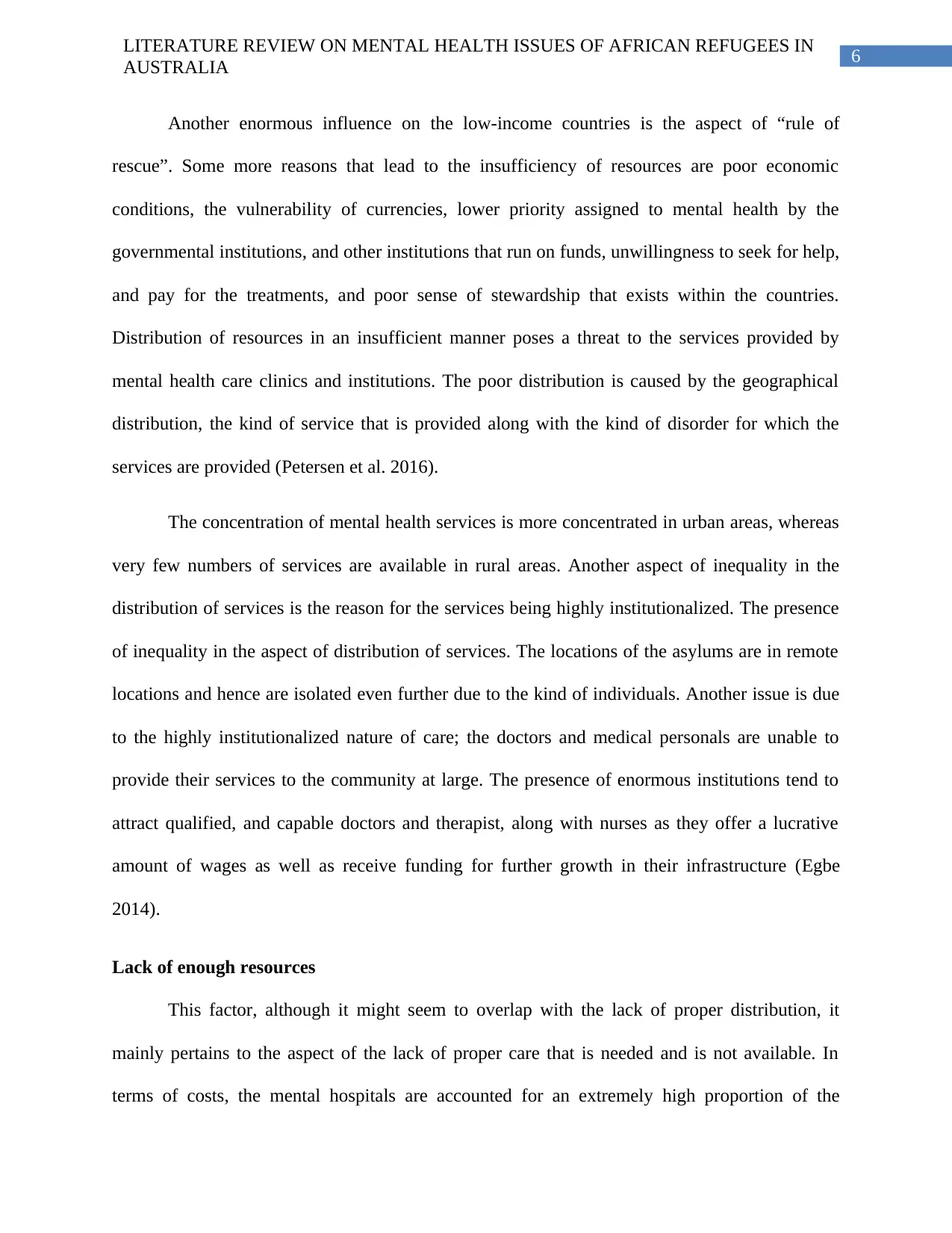
6
LITERATURE REVIEW ON MENTAL HEALTH ISSUES OF AFRICAN REFUGEES IN
AUSTRALIA
Another enormous influence on the low-income countries is the aspect of “rule of
rescue”. Some more reasons that lead to the insufficiency of resources are poor economic
conditions, the vulnerability of currencies, lower priority assigned to mental health by the
governmental institutions, and other institutions that run on funds, unwillingness to seek for help,
and pay for the treatments, and poor sense of stewardship that exists within the countries.
Distribution of resources in an insufficient manner poses a threat to the services provided by
mental health care clinics and institutions. The poor distribution is caused by the geographical
distribution, the kind of service that is provided along with the kind of disorder for which the
services are provided (Petersen et al. 2016).
The concentration of mental health services is more concentrated in urban areas, whereas
very few numbers of services are available in rural areas. Another aspect of inequality in the
distribution of services is the reason for the services being highly institutionalized. The presence
of inequality in the aspect of distribution of services. The locations of the asylums are in remote
locations and hence are isolated even further due to the kind of individuals. Another issue is due
to the highly institutionalized nature of care; the doctors and medical personals are unable to
provide their services to the community at large. The presence of enormous institutions tend to
attract qualified, and capable doctors and therapist, along with nurses as they offer a lucrative
amount of wages as well as receive funding for further growth in their infrastructure (Egbe
2014).
Lack of enough resources
This factor, although it might seem to overlap with the lack of proper distribution, it
mainly pertains to the aspect of the lack of proper care that is needed and is not available. In
terms of costs, the mental hospitals are accounted for an extremely high proportion of the
LITERATURE REVIEW ON MENTAL HEALTH ISSUES OF AFRICAN REFUGEES IN
AUSTRALIA
Another enormous influence on the low-income countries is the aspect of “rule of
rescue”. Some more reasons that lead to the insufficiency of resources are poor economic
conditions, the vulnerability of currencies, lower priority assigned to mental health by the
governmental institutions, and other institutions that run on funds, unwillingness to seek for help,
and pay for the treatments, and poor sense of stewardship that exists within the countries.
Distribution of resources in an insufficient manner poses a threat to the services provided by
mental health care clinics and institutions. The poor distribution is caused by the geographical
distribution, the kind of service that is provided along with the kind of disorder for which the
services are provided (Petersen et al. 2016).
The concentration of mental health services is more concentrated in urban areas, whereas
very few numbers of services are available in rural areas. Another aspect of inequality in the
distribution of services is the reason for the services being highly institutionalized. The presence
of inequality in the aspect of distribution of services. The locations of the asylums are in remote
locations and hence are isolated even further due to the kind of individuals. Another issue is due
to the highly institutionalized nature of care; the doctors and medical personals are unable to
provide their services to the community at large. The presence of enormous institutions tend to
attract qualified, and capable doctors and therapist, along with nurses as they offer a lucrative
amount of wages as well as receive funding for further growth in their infrastructure (Egbe
2014).
Lack of enough resources
This factor, although it might seem to overlap with the lack of proper distribution, it
mainly pertains to the aspect of the lack of proper care that is needed and is not available. In
terms of costs, the mental hospitals are accounted for an extremely high proportion of the
Paraphrase This Document
Need a fresh take? Get an instant paraphrase of this document with our AI Paraphraser
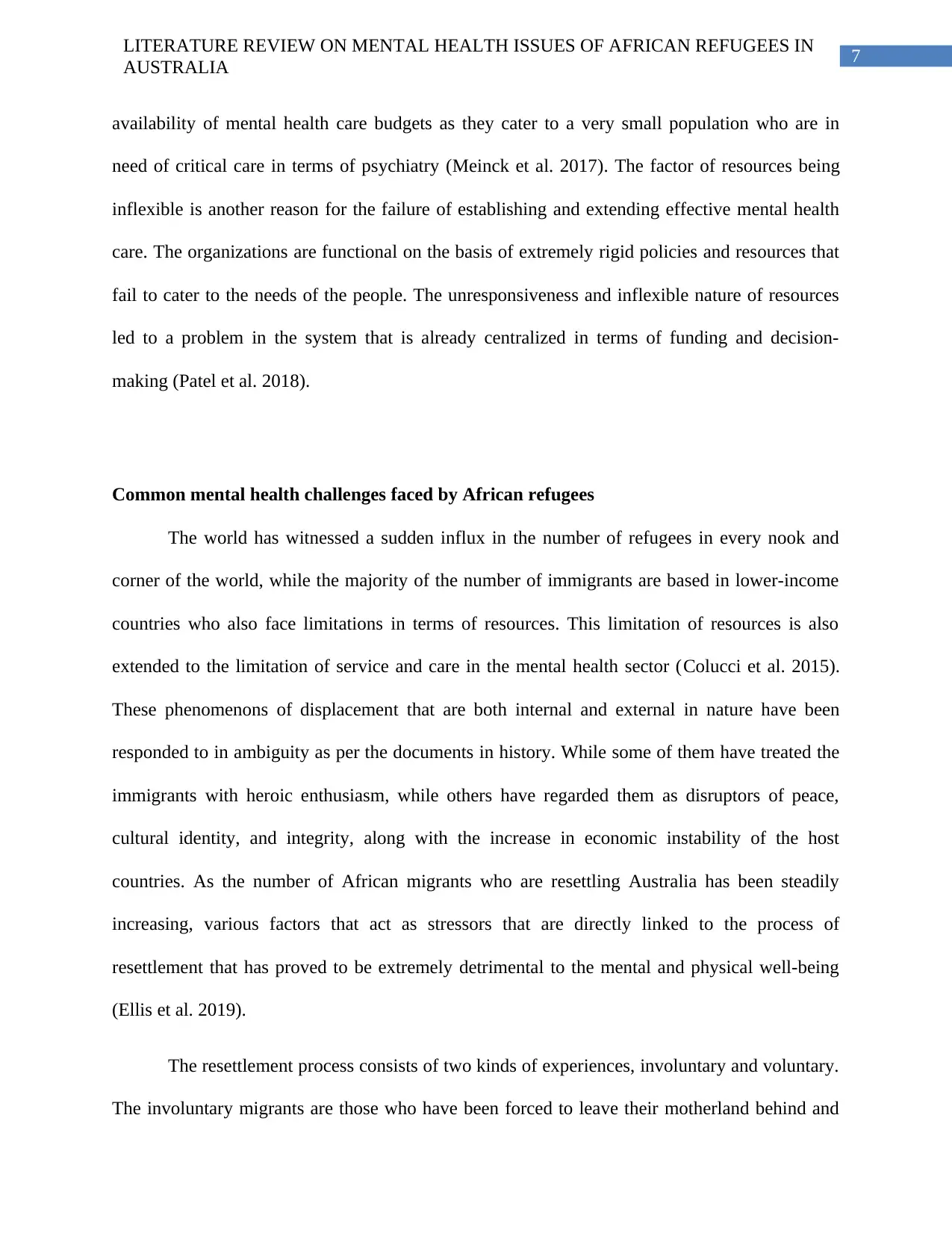
7
LITERATURE REVIEW ON MENTAL HEALTH ISSUES OF AFRICAN REFUGEES IN
AUSTRALIA
availability of mental health care budgets as they cater to a very small population who are in
need of critical care in terms of psychiatry (Meinck et al. 2017). The factor of resources being
inflexible is another reason for the failure of establishing and extending effective mental health
care. The organizations are functional on the basis of extremely rigid policies and resources that
fail to cater to the needs of the people. The unresponsiveness and inflexible nature of resources
led to a problem in the system that is already centralized in terms of funding and decision-
making (Patel et al. 2018).
Common mental health challenges faced by African refugees
The world has witnessed a sudden influx in the number of refugees in every nook and
corner of the world, while the majority of the number of immigrants are based in lower-income
countries who also face limitations in terms of resources. This limitation of resources is also
extended to the limitation of service and care in the mental health sector (Colucci et al. 2015).
These phenomenons of displacement that are both internal and external in nature have been
responded to in ambiguity as per the documents in history. While some of them have treated the
immigrants with heroic enthusiasm, while others have regarded them as disruptors of peace,
cultural identity, and integrity, along with the increase in economic instability of the host
countries. As the number of African migrants who are resettling Australia has been steadily
increasing, various factors that act as stressors that are directly linked to the process of
resettlement that has proved to be extremely detrimental to the mental and physical well-being
(Ellis et al. 2019).
The resettlement process consists of two kinds of experiences, involuntary and voluntary.
The involuntary migrants are those who have been forced to leave their motherland behind and
LITERATURE REVIEW ON MENTAL HEALTH ISSUES OF AFRICAN REFUGEES IN
AUSTRALIA
availability of mental health care budgets as they cater to a very small population who are in
need of critical care in terms of psychiatry (Meinck et al. 2017). The factor of resources being
inflexible is another reason for the failure of establishing and extending effective mental health
care. The organizations are functional on the basis of extremely rigid policies and resources that
fail to cater to the needs of the people. The unresponsiveness and inflexible nature of resources
led to a problem in the system that is already centralized in terms of funding and decision-
making (Patel et al. 2018).
Common mental health challenges faced by African refugees
The world has witnessed a sudden influx in the number of refugees in every nook and
corner of the world, while the majority of the number of immigrants are based in lower-income
countries who also face limitations in terms of resources. This limitation of resources is also
extended to the limitation of service and care in the mental health sector (Colucci et al. 2015).
These phenomenons of displacement that are both internal and external in nature have been
responded to in ambiguity as per the documents in history. While some of them have treated the
immigrants with heroic enthusiasm, while others have regarded them as disruptors of peace,
cultural identity, and integrity, along with the increase in economic instability of the host
countries. As the number of African migrants who are resettling Australia has been steadily
increasing, various factors that act as stressors that are directly linked to the process of
resettlement that has proved to be extremely detrimental to the mental and physical well-being
(Ellis et al. 2019).
The resettlement process consists of two kinds of experiences, involuntary and voluntary.
The involuntary migrants are those who have been forced to leave their motherland behind and
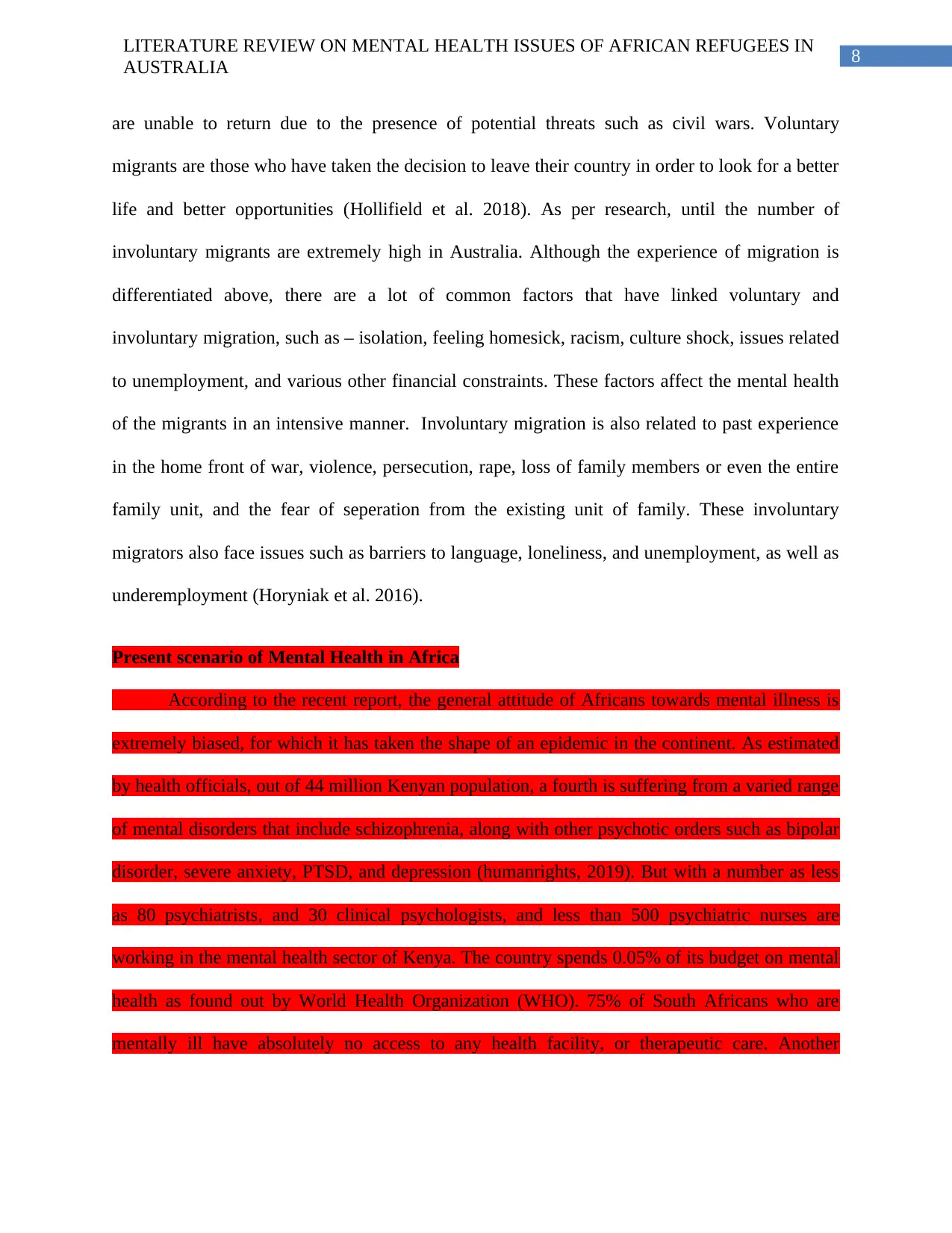
8
LITERATURE REVIEW ON MENTAL HEALTH ISSUES OF AFRICAN REFUGEES IN
AUSTRALIA
are unable to return due to the presence of potential threats such as civil wars. Voluntary
migrants are those who have taken the decision to leave their country in order to look for a better
life and better opportunities (Hollifield et al. 2018). As per research, until the number of
involuntary migrants are extremely high in Australia. Although the experience of migration is
differentiated above, there are a lot of common factors that have linked voluntary and
involuntary migration, such as – isolation, feeling homesick, racism, culture shock, issues related
to unemployment, and various other financial constraints. These factors affect the mental health
of the migrants in an intensive manner. Involuntary migration is also related to past experience
in the home front of war, violence, persecution, rape, loss of family members or even the entire
family unit, and the fear of seperation from the existing unit of family. These involuntary
migrators also face issues such as barriers to language, loneliness, and unemployment, as well as
underemployment (Horyniak et al. 2016).
Present scenario of Mental Health in Africa
According to the recent report, the general attitude of Africans towards mental illness is
extremely biased, for which it has taken the shape of an epidemic in the continent. As estimated
by health officials, out of 44 million Kenyan population, a fourth is suffering from a varied range
of mental disorders that include schizophrenia, along with other psychotic orders such as bipolar
disorder, severe anxiety, PTSD, and depression (humanrights, 2019). But with a number as less
as 80 psychiatrists, and 30 clinical psychologists, and less than 500 psychiatric nurses are
working in the mental health sector of Kenya. The country spends 0.05% of its budget on mental
health as found out by World Health Organization (WHO). 75% of South Africans who are
mentally ill have absolutely no access to any health facility, or therapeutic care. Another
LITERATURE REVIEW ON MENTAL HEALTH ISSUES OF AFRICAN REFUGEES IN
AUSTRALIA
are unable to return due to the presence of potential threats such as civil wars. Voluntary
migrants are those who have taken the decision to leave their country in order to look for a better
life and better opportunities (Hollifield et al. 2018). As per research, until the number of
involuntary migrants are extremely high in Australia. Although the experience of migration is
differentiated above, there are a lot of common factors that have linked voluntary and
involuntary migration, such as – isolation, feeling homesick, racism, culture shock, issues related
to unemployment, and various other financial constraints. These factors affect the mental health
of the migrants in an intensive manner. Involuntary migration is also related to past experience
in the home front of war, violence, persecution, rape, loss of family members or even the entire
family unit, and the fear of seperation from the existing unit of family. These involuntary
migrators also face issues such as barriers to language, loneliness, and unemployment, as well as
underemployment (Horyniak et al. 2016).
Present scenario of Mental Health in Africa
According to the recent report, the general attitude of Africans towards mental illness is
extremely biased, for which it has taken the shape of an epidemic in the continent. As estimated
by health officials, out of 44 million Kenyan population, a fourth is suffering from a varied range
of mental disorders that include schizophrenia, along with other psychotic orders such as bipolar
disorder, severe anxiety, PTSD, and depression (humanrights, 2019). But with a number as less
as 80 psychiatrists, and 30 clinical psychologists, and less than 500 psychiatric nurses are
working in the mental health sector of Kenya. The country spends 0.05% of its budget on mental
health as found out by World Health Organization (WHO). 75% of South Africans who are
mentally ill have absolutely no access to any health facility, or therapeutic care. Another
⊘ This is a preview!⊘
Do you want full access?
Subscribe today to unlock all pages.

Trusted by 1+ million students worldwide
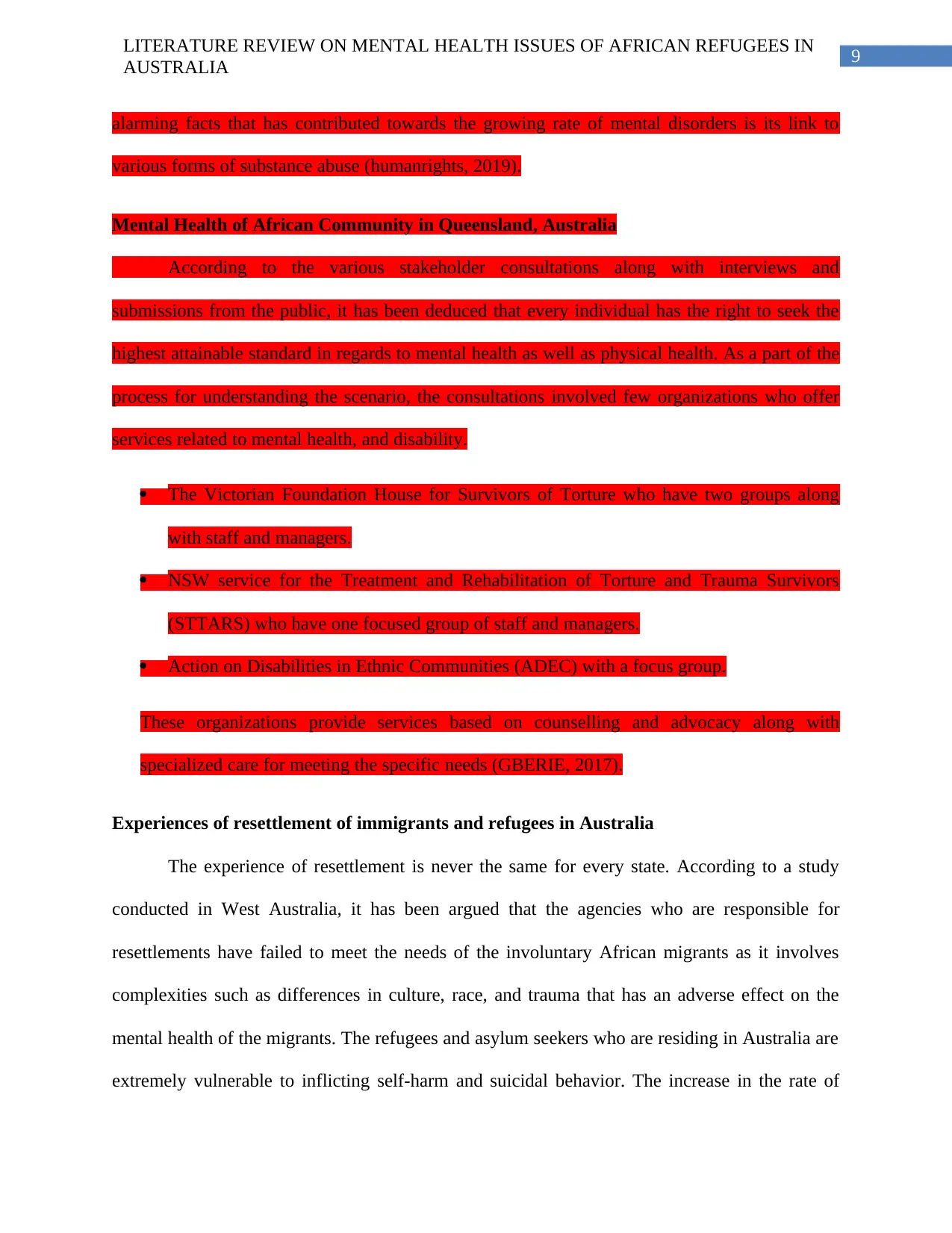
9
LITERATURE REVIEW ON MENTAL HEALTH ISSUES OF AFRICAN REFUGEES IN
AUSTRALIA
alarming facts that has contributed towards the growing rate of mental disorders is its link to
various forms of substance abuse (humanrights, 2019).
Mental Health of African Community in Queensland, Australia
According to the various stakeholder consultations along with interviews and
submissions from the public, it has been deduced that every individual has the right to seek the
highest attainable standard in regards to mental health as well as physical health. As a part of the
process for understanding the scenario, the consultations involved few organizations who offer
services related to mental health, and disability.
The Victorian Foundation House for Survivors of Torture who have two groups along
with staff and managers.
NSW service for the Treatment and Rehabilitation of Torture and Trauma Survivors
(STTARS) who have one focused group of staff and managers.
Action on Disabilities in Ethnic Communities (ADEC) with a focus group.
These organizations provide services based on counselling and advocacy along with
specialized care for meeting the specific needs (GBERIE, 2017).
Experiences of resettlement of immigrants and refugees in Australia
The experience of resettlement is never the same for every state. According to a study
conducted in West Australia, it has been argued that the agencies who are responsible for
resettlements have failed to meet the needs of the involuntary African migrants as it involves
complexities such as differences in culture, race, and trauma that has an adverse effect on the
mental health of the migrants. The refugees and asylum seekers who are residing in Australia are
extremely vulnerable to inflicting self-harm and suicidal behavior. The increase in the rate of
LITERATURE REVIEW ON MENTAL HEALTH ISSUES OF AFRICAN REFUGEES IN
AUSTRALIA
alarming facts that has contributed towards the growing rate of mental disorders is its link to
various forms of substance abuse (humanrights, 2019).
Mental Health of African Community in Queensland, Australia
According to the various stakeholder consultations along with interviews and
submissions from the public, it has been deduced that every individual has the right to seek the
highest attainable standard in regards to mental health as well as physical health. As a part of the
process for understanding the scenario, the consultations involved few organizations who offer
services related to mental health, and disability.
The Victorian Foundation House for Survivors of Torture who have two groups along
with staff and managers.
NSW service for the Treatment and Rehabilitation of Torture and Trauma Survivors
(STTARS) who have one focused group of staff and managers.
Action on Disabilities in Ethnic Communities (ADEC) with a focus group.
These organizations provide services based on counselling and advocacy along with
specialized care for meeting the specific needs (GBERIE, 2017).
Experiences of resettlement of immigrants and refugees in Australia
The experience of resettlement is never the same for every state. According to a study
conducted in West Australia, it has been argued that the agencies who are responsible for
resettlements have failed to meet the needs of the involuntary African migrants as it involves
complexities such as differences in culture, race, and trauma that has an adverse effect on the
mental health of the migrants. The refugees and asylum seekers who are residing in Australia are
extremely vulnerable to inflicting self-harm and suicidal behavior. The increase in the rate of
Paraphrase This Document
Need a fresh take? Get an instant paraphrase of this document with our AI Paraphraser
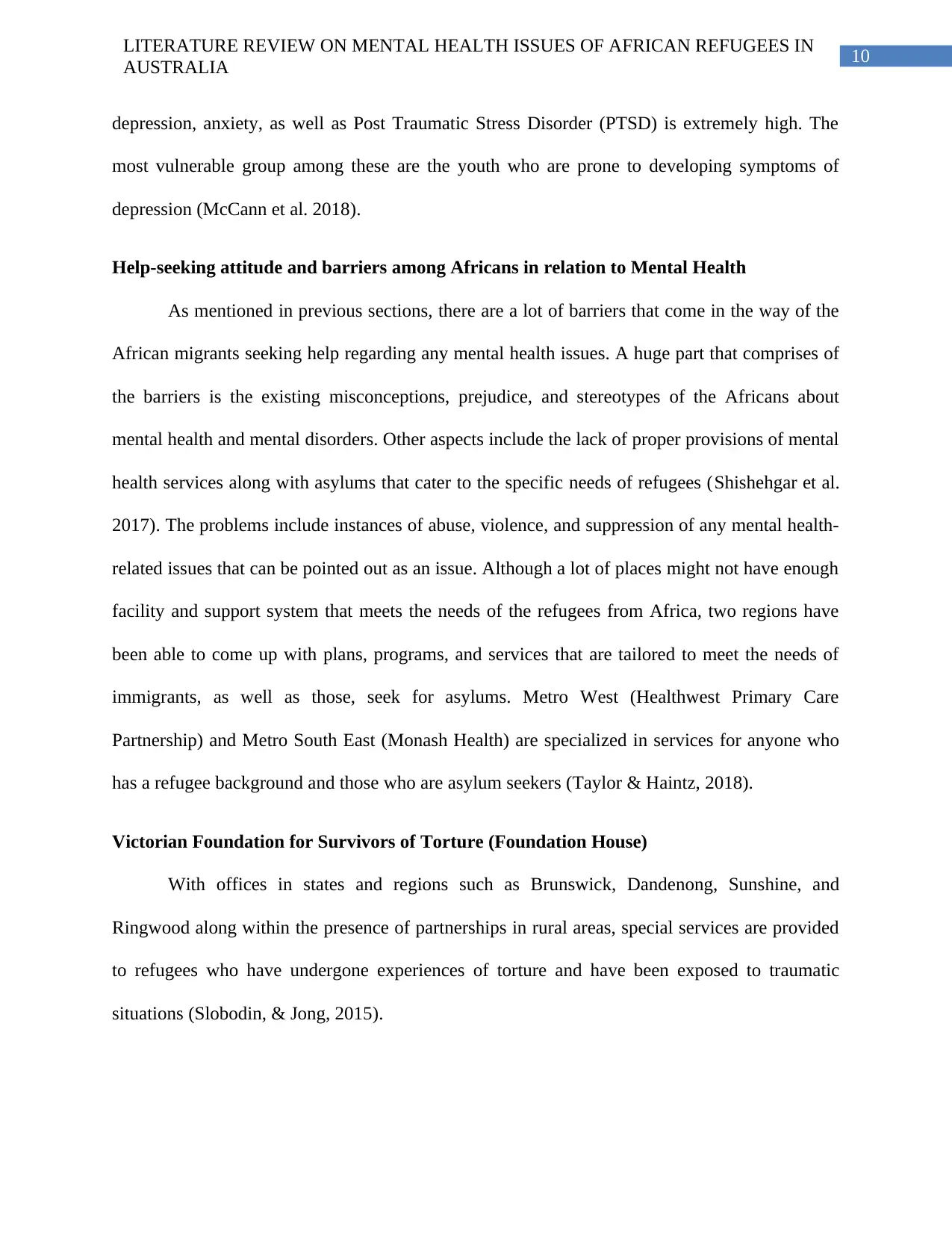
10
LITERATURE REVIEW ON MENTAL HEALTH ISSUES OF AFRICAN REFUGEES IN
AUSTRALIA
depression, anxiety, as well as Post Traumatic Stress Disorder (PTSD) is extremely high. The
most vulnerable group among these are the youth who are prone to developing symptoms of
depression (McCann et al. 2018).
Help-seeking attitude and barriers among Africans in relation to Mental Health
As mentioned in previous sections, there are a lot of barriers that come in the way of the
African migrants seeking help regarding any mental health issues. A huge part that comprises of
the barriers is the existing misconceptions, prejudice, and stereotypes of the Africans about
mental health and mental disorders. Other aspects include the lack of proper provisions of mental
health services along with asylums that cater to the specific needs of refugees (Shishehgar et al.
2017). The problems include instances of abuse, violence, and suppression of any mental health-
related issues that can be pointed out as an issue. Although a lot of places might not have enough
facility and support system that meets the needs of the refugees from Africa, two regions have
been able to come up with plans, programs, and services that are tailored to meet the needs of
immigrants, as well as those, seek for asylums. Metro West (Healthwest Primary Care
Partnership) and Metro South East (Monash Health) are specialized in services for anyone who
has a refugee background and those who are asylum seekers (Taylor & Haintz, 2018).
Victorian Foundation for Survivors of Torture (Foundation House)
With offices in states and regions such as Brunswick, Dandenong, Sunshine, and
Ringwood along within the presence of partnerships in rural areas, special services are provided
to refugees who have undergone experiences of torture and have been exposed to traumatic
situations (Slobodin, & Jong, 2015).
LITERATURE REVIEW ON MENTAL HEALTH ISSUES OF AFRICAN REFUGEES IN
AUSTRALIA
depression, anxiety, as well as Post Traumatic Stress Disorder (PTSD) is extremely high. The
most vulnerable group among these are the youth who are prone to developing symptoms of
depression (McCann et al. 2018).
Help-seeking attitude and barriers among Africans in relation to Mental Health
As mentioned in previous sections, there are a lot of barriers that come in the way of the
African migrants seeking help regarding any mental health issues. A huge part that comprises of
the barriers is the existing misconceptions, prejudice, and stereotypes of the Africans about
mental health and mental disorders. Other aspects include the lack of proper provisions of mental
health services along with asylums that cater to the specific needs of refugees (Shishehgar et al.
2017). The problems include instances of abuse, violence, and suppression of any mental health-
related issues that can be pointed out as an issue. Although a lot of places might not have enough
facility and support system that meets the needs of the refugees from Africa, two regions have
been able to come up with plans, programs, and services that are tailored to meet the needs of
immigrants, as well as those, seek for asylums. Metro West (Healthwest Primary Care
Partnership) and Metro South East (Monash Health) are specialized in services for anyone who
has a refugee background and those who are asylum seekers (Taylor & Haintz, 2018).
Victorian Foundation for Survivors of Torture (Foundation House)
With offices in states and regions such as Brunswick, Dandenong, Sunshine, and
Ringwood along within the presence of partnerships in rural areas, special services are provided
to refugees who have undergone experiences of torture and have been exposed to traumatic
situations (Slobodin, & Jong, 2015).
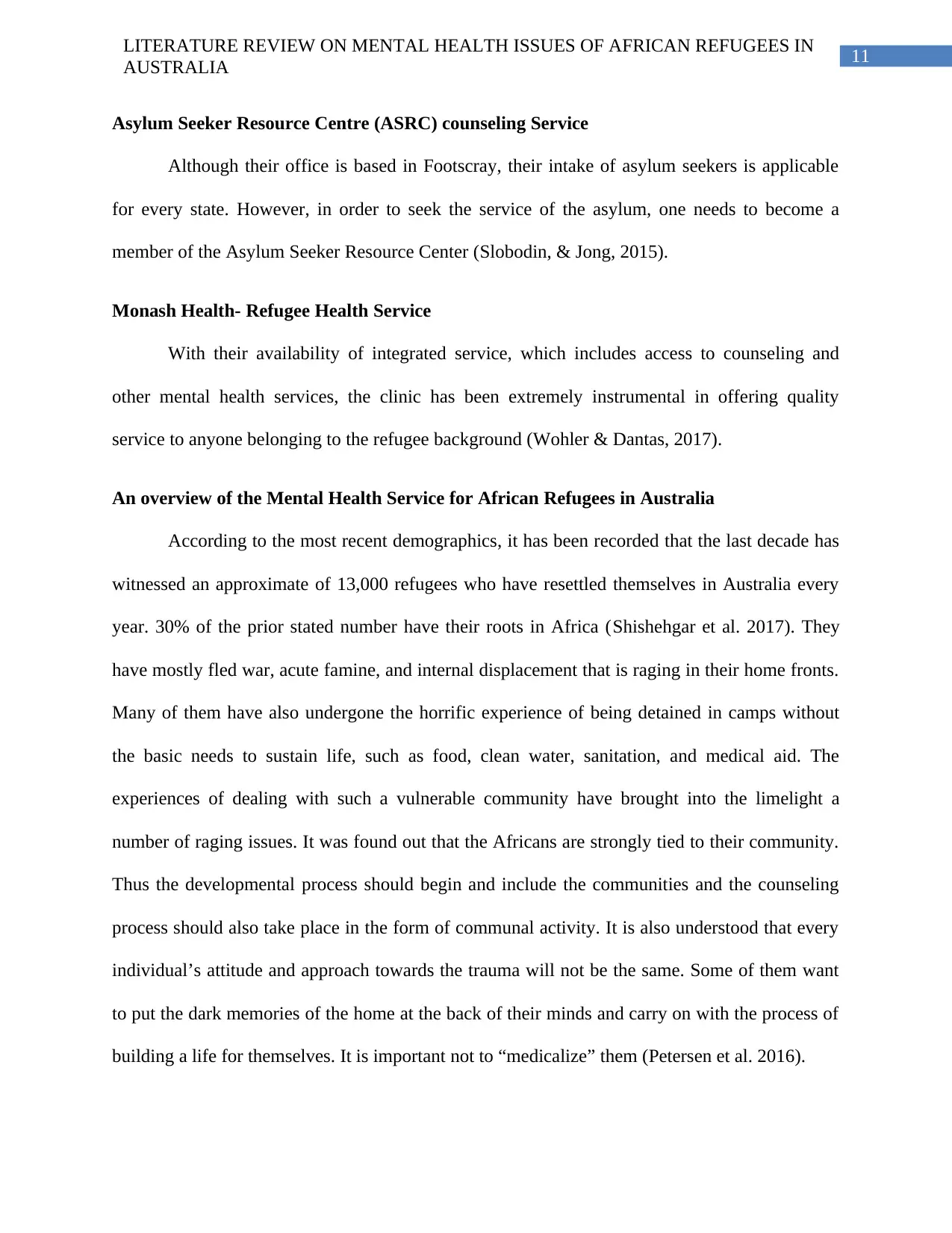
11
LITERATURE REVIEW ON MENTAL HEALTH ISSUES OF AFRICAN REFUGEES IN
AUSTRALIA
Asylum Seeker Resource Centre (ASRC) counseling Service
Although their office is based in Footscray, their intake of asylum seekers is applicable
for every state. However, in order to seek the service of the asylum, one needs to become a
member of the Asylum Seeker Resource Center (Slobodin, & Jong, 2015).
Monash Health- Refugee Health Service
With their availability of integrated service, which includes access to counseling and
other mental health services, the clinic has been extremely instrumental in offering quality
service to anyone belonging to the refugee background (Wohler & Dantas, 2017).
An overview of the Mental Health Service for African Refugees in Australia
According to the most recent demographics, it has been recorded that the last decade has
witnessed an approximate of 13,000 refugees who have resettled themselves in Australia every
year. 30% of the prior stated number have their roots in Africa (Shishehgar et al. 2017). They
have mostly fled war, acute famine, and internal displacement that is raging in their home fronts.
Many of them have also undergone the horrific experience of being detained in camps without
the basic needs to sustain life, such as food, clean water, sanitation, and medical aid. The
experiences of dealing with such a vulnerable community have brought into the limelight a
number of raging issues. It was found out that the Africans are strongly tied to their community.
Thus the developmental process should begin and include the communities and the counseling
process should also take place in the form of communal activity. It is also understood that every
individual’s attitude and approach towards the trauma will not be the same. Some of them want
to put the dark memories of the home at the back of their minds and carry on with the process of
building a life for themselves. It is important not to “medicalize” them (Petersen et al. 2016).
LITERATURE REVIEW ON MENTAL HEALTH ISSUES OF AFRICAN REFUGEES IN
AUSTRALIA
Asylum Seeker Resource Centre (ASRC) counseling Service
Although their office is based in Footscray, their intake of asylum seekers is applicable
for every state. However, in order to seek the service of the asylum, one needs to become a
member of the Asylum Seeker Resource Center (Slobodin, & Jong, 2015).
Monash Health- Refugee Health Service
With their availability of integrated service, which includes access to counseling and
other mental health services, the clinic has been extremely instrumental in offering quality
service to anyone belonging to the refugee background (Wohler & Dantas, 2017).
An overview of the Mental Health Service for African Refugees in Australia
According to the most recent demographics, it has been recorded that the last decade has
witnessed an approximate of 13,000 refugees who have resettled themselves in Australia every
year. 30% of the prior stated number have their roots in Africa (Shishehgar et al. 2017). They
have mostly fled war, acute famine, and internal displacement that is raging in their home fronts.
Many of them have also undergone the horrific experience of being detained in camps without
the basic needs to sustain life, such as food, clean water, sanitation, and medical aid. The
experiences of dealing with such a vulnerable community have brought into the limelight a
number of raging issues. It was found out that the Africans are strongly tied to their community.
Thus the developmental process should begin and include the communities and the counseling
process should also take place in the form of communal activity. It is also understood that every
individual’s attitude and approach towards the trauma will not be the same. Some of them want
to put the dark memories of the home at the back of their minds and carry on with the process of
building a life for themselves. It is important not to “medicalize” them (Petersen et al. 2016).
⊘ This is a preview!⊘
Do you want full access?
Subscribe today to unlock all pages.

Trusted by 1+ million students worldwide
1 out of 18
Related Documents
Your All-in-One AI-Powered Toolkit for Academic Success.
+13062052269
info@desklib.com
Available 24*7 on WhatsApp / Email
![[object Object]](/_next/static/media/star-bottom.7253800d.svg)
Unlock your academic potential
Copyright © 2020–2026 A2Z Services. All Rights Reserved. Developed and managed by ZUCOL.





